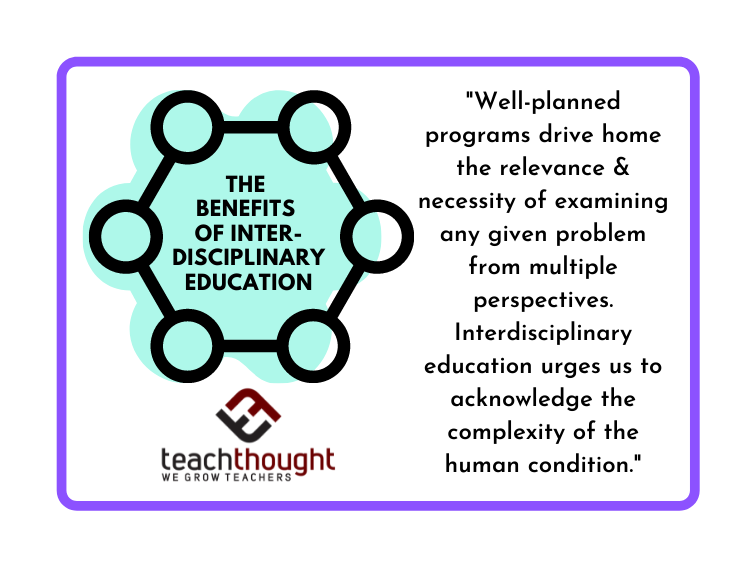
The Benefits And Necessity Of Interdisciplinary Education
contributed by Dennis Wesley, Independent educational researcher
Why is interdisciplinary learning important?
Is it all relevant, let alone necessary, in the context of contemporary education, which is dominated by engineering, the applied sciences, and other disciplines typically associated with good job prospects? Moreover, if one deems it a necessity, what disciplines should one include to make education truly interdisciplinary? These are just some questions advocates of interdisciplinarity encounter rather routinely from both parents and educators. On the other hand, some parents even consider interdisciplinary training a tedious, altogether avoidable complication.
See also Questions To Guide Inquiry-Based Learning
While it is clear that interdisciplinary training includes an introduction to the humanities, it must also be conceded that the sheer breadth of the humanities makes it difficult for educators to zero in on the best, most relevant disciplines. At the same time, the popularity of the humanities has been decreasing rather steadily. See, for instance, Benjamin Schmidt’s August 2018 article on the alarming decline in the number of humanities majors in the US since the 2008 financial crisis. Well-planned interdisciplinary programs, therefore, are also highly likely to inject new life into the humanities.
Addressing Technological Developments from the Interdisciplinary Perspective
As some have argued, the very salience of engineering and the applied sciences, coupled with the technological developments these fields have enabled, has necessitated interdisciplinary training. For instance, as innovations continue to flood the automation and artificial intelligence industry—and indeed other industries—ethics is becoming an especially pertinent field.
Should we welcome technologies that are likely to endanger human labor?
See also 12 Things Every Lesson You Teach Should Have
How might this affect employment/unemployment rates? Should such a situation indeed arise, what are human beings likely to do with their newfound ‘free time’?
Are we even capable of leading satisfying lives without employment as we know it today?
Ethics, as a discipline, encourages learners to grapple with these questions, which are undeniably important in the context of automation-related discussions. In fact, it can be argued that ethics is indispensable in the context of assessing the impacts—be they cultural, political, or even physical—of any technological development. Other prominent humanities disciplines such as philosophy, psychology, and even sociology encourage learners to consider how cultural differences might factor into people’s perception of groundbreaking technological developments.
In essence, these disciplines urge us to avoid simplistic explanations, encouraging us instead to look at how people make and seek meaning. That is, a community may reject a particular technology not because it (the community) is backward, but because the applications of the technology in question might bring them more cons than pros. In other words, culture is an important factor in most matters, and it determines how people perceive changes, including what are billed as groundbreaking technological innovations. Ultimately, in this particular context, humanities disciplines will enable us to recognize that the effect of technology on human life is not uniform.
This is especially important to understand since more and more people are actively involved in designing technologies that address complex, real-life situations. Therefore, engineers and designers must also understand the importance of cultural relativism and the capacity for moral reasoning; interdisciplinary training is one of the best ways to ensure this.
Other Factors that Necessitate Interdisciplinary Training
According to this study, an interdisciplinary approach has been found to have the following benefits: it enables learners to recognize bias, think critically, and address ambiguity better. More importantly, an interdisciplinary approach, as the report shows, also allows learners to “acknowledge and appreciate ethical concerns.” At the same time, we must recognize that these are not guarantees; interdisciplinary education is certainly not the ultimate answer to all educational problems.
However, when practiced earnestly, it is significantly better than one-dimensional education. Indeed, well-planned programs drive home not just the relevance but also the necessity of examining any given problem from multiple disciplinary perspectives. In short, interdisciplinary education urges us to acknowledge the complexity of the human condition. Moreover, an interdisciplinary perspective is necessary also because the world, our object of inquiry, is not merely black and white.
Being especially complex, human affairs defy simplistic explanations. Interdisciplinary education, therefore, allows us to better address contradictions and ambiguities.
Interdisciplinarity: Real-World Applications
While ethics, sociology, and anthropology are distinct disciplines, they nonetheless share very similar concerns. Moreover, nothing human is off-topic for a student of ethics, and the ubiquity of the internet has opened up new areas of critical ethical inquiry. For instance, as this article on the difficulties faced by Facebook content moderators shows, determining and assessing moral or ethical standards is especially difficult in the context of social media.
Notably, it is not just the process of identifying offensive or inflammatory content that’s dubious. To protect the safety of moderators, contracts are shrouded in secrecy and involve rigid non-disclosure clauses. Moreover, as the above article shows, the moderation business—a fairly recent development—requires critical attention, as moderators tend to be exploited and exposed to inhumane working conditions.
Employers typically state that the need for secrecy inevitably complicates the moderation business and that things will improve with time. Interdisciplinary education, therefore, can enable students to critically evaluate and alleviate this situation.
Needless to say, the industry could benefit from ethical and sociological insights. Interdisciplinary education is highly necessary and relevant today.